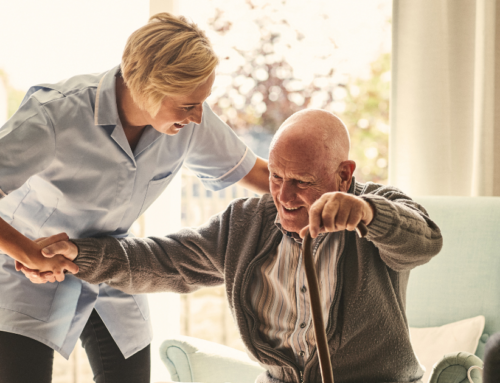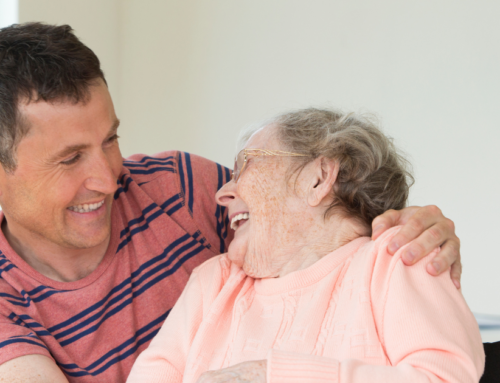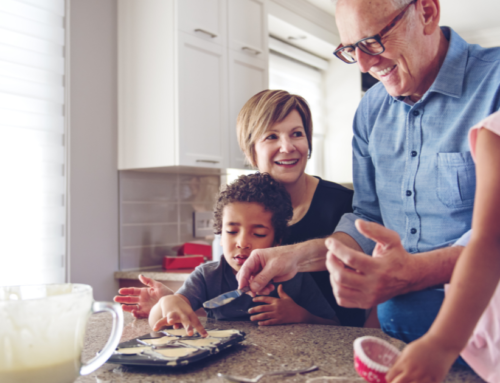Acting as a primary caregiver can often compromise your own health and wellness. For those who provide care for family members, this reality can be extremely difficult to accept. Feeling overworked, exhausted, stressed out, or simply low on personal time tends to leave caregivers with a sense of guilt.
When your top priority is your loved one’s health and wellbeing, it can feel impossible to justify your own needs. Maintaining your own wellness, however, is the opposite of selfish when someone you love needs long term care.
Find the Balance Between Caregiving and Self-Care
Caring for a senior or chronically ill person requires a healthy and capable caregiver; it is a demanding task, especially for one person to take on. Because the demands of full-time caregiving can affect your physical, mental, and emotional health, it is extremely important to remain conscientious of your own wellbeing. Creating a balance between caregiving and self care will not only benefit you, but your loved one as well. Maintaining your own health, wellness and happiness will ensure that you can put your best foot forward for your loved one.
Carving out time for yourself in the midst of caregiving always proves difficult; yet, it is an important first step in assuring that your duties as a caregiver do not compromise your own health and wellness. On top of juggling a busy schedule, it might feel uncomfortable reaching out for help when caregiving. Seeking out some form of respite care, whether it be from a friend, family member, or professional service, will likely serve as the easiest solution to finding the time needed to promote your own wellness. Once you find the ability to occasionally take a step back from your duties as a caregiver, you will be able to work on reducing stress and staying healthy.
Acknowledge Your Own Needs
When placing so much energy and attention on the wellbeing on a loved one, informal family caregivers tend to neglect their own needs. Caregivers often deny themselves of basic needs such as eating well and exercising, getting enough sleep, checking up on their own health, or finding the emotional support they may need.
Exercise and Healthy Eating
It should be no shock to see the words “exercise and healthy eating” as the primary advice for promoting a caregiver’s health and wellness. For a caregiver with little time to spare, however, finding the time to maintain either task can prove difficult. It may seem like preparing a healthy meal or going to the gym will eat into your already sparse free time.

Luckily, with some thought and creativity you can integrate these practices into your day to day life as a caregiver. If you find yourself eating junk food out of convenience, there are a number of ways to keep healthier food more accessible. One simple solution is to stock your home (or your loved one’s home, if you commute to them to provide care), with more healthful snacks that do not require preparation. Swapping out typical junky snacks with nuts, yogurt, or fruit can greatly improve your health. This strategy is surprisingly easy as it takes no more time to reach for these ready-to-eat foods as it does a bag of chips. If you cook meals for your loved one, also consider cooking food that the both of you can eat. This is a win-win because it ensures that your loved one is getting healthy and nutritious meals as well as you.
Exercise is another key in maintaining both physical and mental health. On top of keeping you in shape, exercise is known to reduce stress, improve sleep, and increase cognitive ability. While time for exercise may seem like a luxury you simply cannot afford, allotting even a small fraction of your day to physical activity can make a huge positive difference for both your mind and body. Just 30 to 60 minutes a day can help boost your energy levels and help you feel more equipped to handle the many challenges of your duties as a caregiver.
Involve Your Loved One in Your Own Health and Wellness Routine
You can also incorporate physical activity into your work in a way that can be fun for your loved one. Exercise with your loved one, modifying the movements for them so that they can easily participate. If the person you care for is too physically limited to participate, make your exercise fun for them too. Dance for them or let them watch as you do a workout video; it may seem silly at first but these activities can be healthy and fun for the both of you.
If you need to manage your stress levels, you may want to consider slowing down the pace of your exercise to help calm yourself. Consider trying out yoga or a different meditative exercise. This can help you gain focus and peace of mind while you deal with emotional and stressful situations.
Tackling Sleep Deprivation
Sleep deprivation is one of the most common afflictions for caregivers, a problem which can have serious effects on other aspects of one’s health down the line. Sleep deprivation may be due to stress, or simply due to a full schedule. Finding healthy coping mechanisms to reduce stress, such as meditation, can help you to attain a greater night’s sleep. If you have other part-time caregivers helping with care during the day, taking short naps can help restore energy.
If you struggle with sleep deprivation or just a general sense of exhaustion from full time caregiving, you may want to consider respite care for your loved one. Respite care consists of hiring part-time caregivers to supplement the time you spend caring, and often works as a great option for primary familial caregivers who sometimes need a bit of a break.
Remember Healthcare for Yourself
Your days as a caregiver likely consist of driving to doctor’s visits or meeting with medical professionals to discuss the health of your loved one, so it is no surprise that frequenting your own health checkups might sound unappealing. However, responsibly monitoring your own health still remains important even if the health needs of your loved one seem more intense or pertinent. Remember that if your health declines, you may be less capable of providing hands on care for you loved one. While professional care services can provide care when your duties become too difficult, avoiding any unnecessary illnesses will leave you in better condition to personally take care of your loved one.
Find Someone To Talk To
Acting dually as a caregiver and family member for someone can become very emotional. You may perceive your relationship changing with the person you are caring for, or experience sadness at witnessing them in pain or in need of extra help. Having someone you can confide in and express your thoughts to can help prevent these emotions from becoming overwhelming. You might find emotional support in a friend or family member who can empathize with your experience or who has partaken in caregiving before. They may be able to offer you invaluable advice.
If you feel uncomfortable talking about your experience with caregiving to those close to you, caregivers can also seek out support groups and other mental health services to help alleviate the stress that comes with caregiving. Support groups provide a safe, non-judgmental platform to talk. Attending one on one counseling services is another viable option if you need help managing your emotions while providing care. A therapist is usually covered by insurance and will provide you with steady support whenever you need it.
What Not To Do
Now that you have considered a few options that can help promote your own health and wellness as a caregiver, it is important to review some habits that caregivers should try to avoid. Approaching your responsibilities as a caregiver with the proper mindset, as well as avoiding activities that can worsen your health, can help make your job less stressful.
Avoid Excessive Consumption of Alcohol or Drugs
Obviously, using drugs will inhibit your ability to provide top care for your family member. Additionally, substance abuse inevitably hinders your mental and physical health. Living through stressful situations such as the illness of a loved one often leaves people more susceptible to substance abuse, so remaining hypervigilant about your drug and alcohol use will ensure your health and safety.
Do Not Compare Your Situation to Others
While many people go through the pain and stress of caring for a sick or aging loved one, every family is different. Just because someone else finds their job as a caregiver more rewarding or gratifying does not mean you have to feel the same way. Likewise, just because someone else’s duties as a caregiver may seem more demanding than yours does not mean you should work yourself past your breaking point. It is okay to feel burned out or want a break from caregiving.
Do Not Act Out of Obligation
Instead, make sure to evaluate why you are providing the care that you are. If it is simply because you believe that keeping caregiving within the family is the ethical thing to do, you may want to reconsider your motives. Acting as a caregiver purely out of a sense of obligation often leads to frustration, resentment, and strained relationships. If this has been the case in your experience, you may want to take a step back from your duties if you have the ability to, or reach out to support systems to help you figure out a better outlook on your situation.
Work Past Any Feelings of Guilt
Perhaps the most difficult emotion that family caregivers struggle with revolves around a sense of guilt when feeling tired or overworked. You might feel guilty simply for needing a break. Understandably, you want to focus your complete attention on the comfort and health of your loved one. Neglecting your own needs, however, will be detrimental to the both of you. Caring for yourself FIRST will help you do the best job possible as a caregiver. Consider the instructions you always receive on an airplane in case of emergency: put on your oxygen mask first, so you can then more effectively help those around you. If you prioritize your own health and wellness as a caregiver, you will be better equipped to, metaphorically, help your loved one “put on their oxygen mask”.







